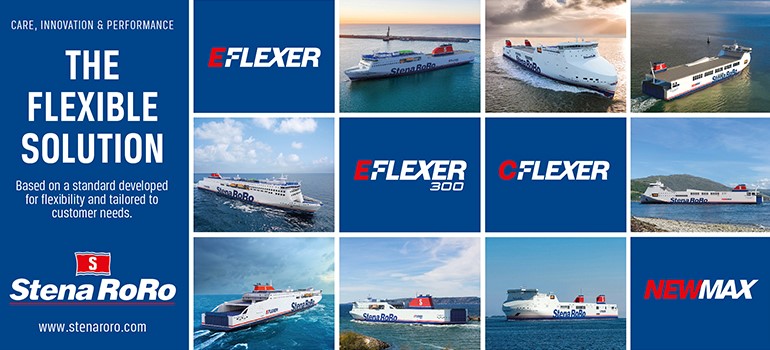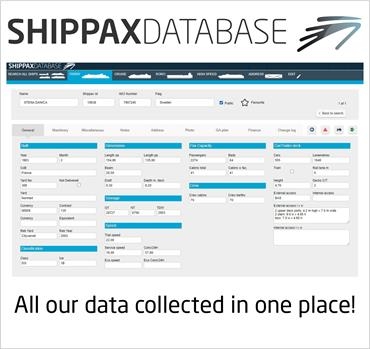
Claes Berglund
Quick Q&As - Claes Berglund
InterviewThis interview with Claes Berglund, Director Public Affairs & Sustainability Stena, President ECSA, Board Member Interferry, was first published in the July/August 2020 issue of our monthly magazine Shippax Info.
“THE CRISIS HAS HIGHLIGHTED THE IMPORTANCE OF FERRIES AND THEIR ROLE IN KEEPING FREIGHT LANES OPEN”
Name: Claes Berglund
Position: Director Public Affairs & Sustainability Stena, President ECSA, Board Member Interferry
Age: 55
Civil status and family: Lovely wife and three boys
Place of birth: Gothenburg
Could you briefly introduce yourself and your career path in shipping?
My grandfather was a shipowner in Gothenburg and my father also spent part of his life in shipping. At the age of 17, I was put on INGRID GORTHON bound for Philadelphia, my first real experience of the big oceans. I later joined the Swedish Navy and ended my career there as Commanding Officer of a small minesweeper. After studies in Business and Science, I wanted to start my career in a shipping company but ended up in logistics, where I spent almost 20 years and learned how to build efficient supply chains and organisations. Only at the millennium did I finally join a real commercial shipping company when I took a seat on the executive board of Stena Line. I have now been in the Stena Group for almost 20 years and have enjoyed every day.
You became ECSA President at the turn of this year, a position you will hold for two years. What is high on your agenda as President of ECSA?
First of all, I would like to say that I’m very honoured to have been trusted for this position and that I will dedicate much time and effort to defend the interest of all European shipowners. As the President, my most important task – together with the secretariat – is to ensure that the organisation delivers value to the members and makes European shipowners successful. European shipping is 40% of world shipping and we have a big responsibility to have a close dialogue with policymakers and regulators so that the industry can continue to deliver value to society in a sustainable way while keeping profitability as high as possible. It’s a delicate balance and ECSA is there to make it work for everybody.
What has been the impact of COVID-19 on the European shipping sector in general and the ferry industry in particular? Is ECSA in favour of subsidies to weather this crisis? If so, how should these be regulated?
The COVID-19 crisis came extremely quickly and had immediate effects on most parts of European shipping. The container lines had imbalances and so empty containers started piling up in the wrong places when goods needed shifting from elsewhere; the cruise sector suffered a sudden complete stop, while crew changes became more or less impossible to conduct due to the lack of flights, to mention just a few things. As we all know, the passenger side of the ferry sector also dropped to more or less zero. Other sectors such as tanker or bulk shipping were less effected initially and, for tankers, there were even some weeks with very good rates on the spot market. Some shipping companies have benefitted from national support schemes mainly for land-based personnel. Certain ferry lines have been supported with financial aid to avoid layups and to ensure that essential cargoes continue to be delivered.Generally, subsidies to specific operators distort competition and should be avoided, but there are always certain situations where it can be necessary. It’s important that any support is in line with state aid guidelines and limited in time and scope.
Ferries have played a key role in recent months, keeping goods moving. Is it correct to assume that the ferry sector will more easily digest this crisis than other sectors in shipping?
The crisis has highlighted the importance of ferries and their role in keeping freight lanes open – which is a positive thing. People ask us why the ferries are still running when there are no passengers and we need to tell them that it’s because we need to deliver food and medicines. It’s hard to compare different sectors but, for sure, if the ferry sector misses the whole summer season in 2020, it will be extremely tough for operators. I believe that the cruise and the ferry sectors are among the ones that are suffering the most.
Besides being ECSA President, you are first and foremost Stena AB’s Director of Public Affairs and Sustainability. What is sustainable shipping and what are the fuels of the future in the view of Stena?
Shipping is contributing to world growth by enabling global and local trade. Sustainable shipping is contributing to a better world while minimising any negative effects. The industry is facing a huge challenge to transition from fossil fuels to something that does not add more greenhouse gases to the atmosphere. The shipowners, including Stena, have a responsibility to contribute to this transition. Apart from running some projects of our own, using methanol and batteries, we are also trying to contribute to larger forums such as the Global Industry Alliance for low carbon shipping and Global Maritime Forum. Nobody can do this by themselves, so collaboration in the wider industry is key.It’s too early to say what the final solution will be for the different shipping segments – but hydrogen and batteries will for sure play important roles.
Specialists have warned us that GHG emissions from shipping will have to be reduced by 80% rather than 50% come 2050 since the fleet capacity will have increased compared to the benchmark year of 2008. Do you agree? Does this implicate zero-emission ships by 2050?
The target is to halve emissions by 2050 in absolute terms. Since trade – and therefore the world fleet – will probably double during this time, the consequence is that the carbon intensity has to be reduced by much more than 50%. I believe we will see zero-emission vessels much earlier than 2050 and I expect ferries to take a lead in this respect since regional solutions are much more easy to implement. The fact that ferries normally operate between two or three ports makes them easier to change in many respects.
Are you active on social media?
Not very; I’m trying but there is a lot of nonsense out there. I enjoy when people publish ideas and reflections rather than what they are eating.
What sports do you practice?
I try to keep up with my boys in golf but I’m losing. I also enjoy bicycling and take spinning classes during the dark and cold part of the year.
What are your holiday plans for the COVID-19 summer?
This summer is a great opportunity to explore nearby regions by car. Do something different and break normal patterns – who knows what will come out of that?
What music do you like?
Spotify tells me I like everything from country to classical and contemporary hits and it produces nice playlists for me.
What is your favourite dinner and drink combination?
Laughter and good friends can make any meal to a perfect combination but if fresh seafood and a good white wine is added I’m even happier!
Jul 01 2020
Most read
The new owner of the Oslo-Fredrikshavn-Copenhagen line is investing heavily in the ships
Oct 31 2024
CORSICA linea and Spinergie combine artificial intelligence and maritime decarbonization
Oct 18 2024
Northern Ireland-led maritime project explores scalable green methanol fuel for the maritime industry
Oct 22 2024






















